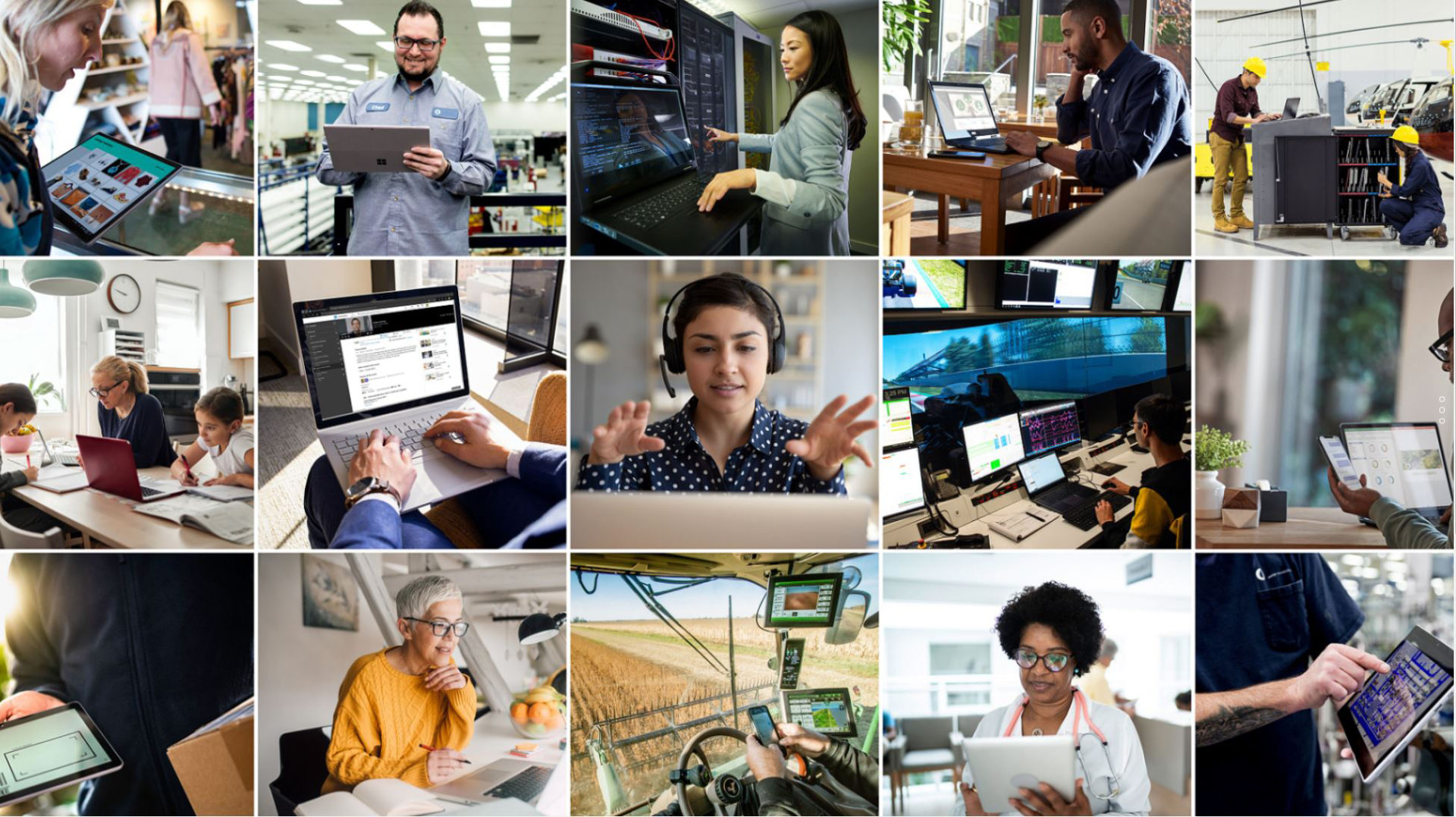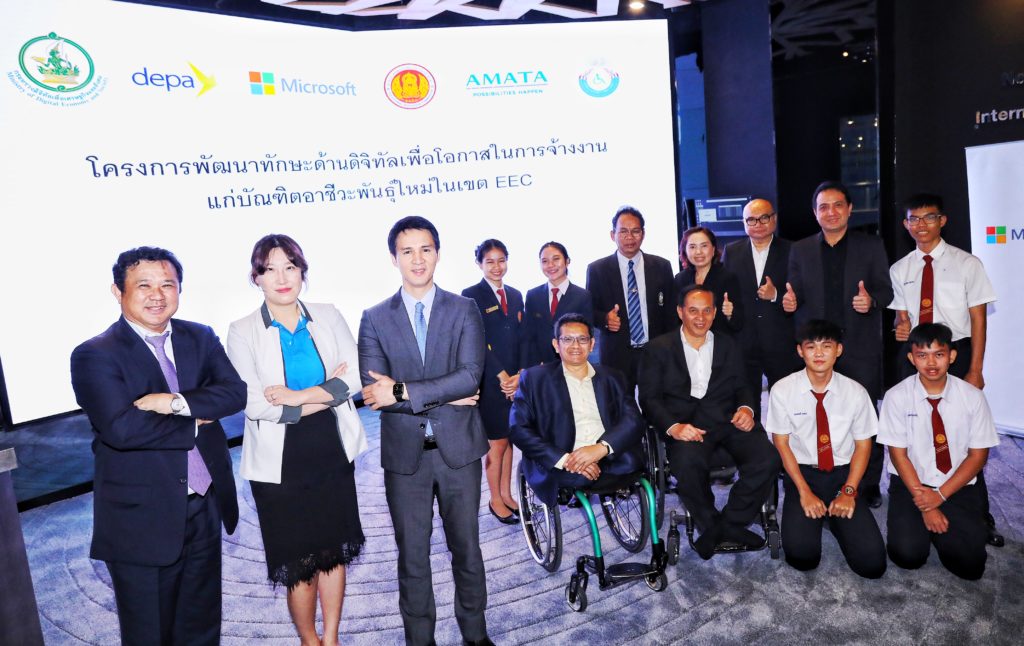Bangkok – 24 July 2020 – — Microsoft Corp. recently announced a new global skills initiative aimed at bringing more digital skills to 25 million people worldwide by the end of the year. The announcement comes in response to the global economic crisis caused by the COVID-19 pandemic. Expanding access to digital skills is an important step in accelerating economic recovery, especially for the people hardest hit by job losses.
The Asia Pacific region has the highest number of workers at 1.09 billion people in countries with workplace closures due to the pandemic. The region also has the highest number of informal workers in countries with lockdown measures at 829 million, which account for over 60% of all informal workers in APAC. The IMF projects that with the pandemic, APAC countries could see reductions to their GDP growth rate in 2020 of between 3% and 10%, while projected job losses in APAC range from 5-7% of total employment. Against this backdrop, Thailand faces the prospect of a 9.7% decline in GDP and 7.1% in projected job losses.
In APAC, the pandemic is likely to have the largest job impacts on the hotels, restaurants and transport services sectors where 5-6% of jobs could be lost. Youth, MSME owners, low-income, freelance, and informal workers are likely to bear a disproportionate share of job losses due to the COVID-19 crisis. Thai daily-wage workers, urban migrant worker, women, and universities graduates are also among those bearing the brunt of the pandemic’s impact on jobs in the country. Furthermore, over 18% of jobs in Thailand’s hotel, restaurant and transport services sectors are projected to be at risk.[1]
“COVID-19 has created both a public health and an economic crisis, and as the world recovers, we need to ensure no one is left behind,” said Microsoft CEO Satya Nadella. “Today, we’re bringing together resources from Microsoft inclusive of LinkedIn and GitHub to reimagine how people learn and apply new skills — and help 25 million people facing unemployment due to COVID-19 prepare for the jobs of the future.”
This initiative, detailed on the Official Microsoft Blog, includes immediate steps to help those looking to reskill and pursue an in-demand job and brings together every part of the company, combining existing and new resources from LinkedIn, GitHub and Microsoft. This includes:
- The use of data to identify in-demand jobs and the skills needed to fill them.
- Free access to learning paths and content to help people develop the skills these positions require.
- Low-cost certifications and free job-seeking tools to help people who develop these skills pursue new jobs.
This is a comprehensive technology initiative that will build on data and digital technology. It starts with data on jobs and skills from the LinkedIn Economic Graph. It provides free access to content in LinkedIn Learning, Microsoft Learn, and the GitHub Learning Lab, and couples these with Microsoft Certifications and LinkedIn job-seeking tools. These resources can all be accessed at a central location, opportunity.linkedin.com, and will be broadly available online in four languages: English, French, German and Spanish.
Learning resources available under the program are carefully chosen to match the needs of the workforce and include:
- Basic Digital Literacy: Microsoft Digital Literacy is designed for anyone with basic reading skills who wants to learn the fundamentals of using digital technologies. This course will help individuals gain the digital skills necessary to engage in a digital economy and improve livelihoods. Available at https://www.microsoft.com/en-us/digitalliteracy/home
- Role Based Skills: Provide the most relevant skills for different career paths with business, creative, and tech courses depending on the requirements of each role. Available at https://www.linkedin.com/learning/
- Tech Skills: Microsoft Learn enhances learners’ technical skills through multiple approaches, from exploring a topic in-depth through guided paths to learning how to accomplish a specific task through individual modules. Completion grants Microsoft Certification to the learner. Available at https://docs.microsoft.com/en-us/learn/
In line with the global initiative, Microsoft Thailand and depa are continuing their “Advancing the Future of Work” program, which seeks to close the digital skills gap and enhance employability of a new generation of 6,000 vocational school graduates in Chachoengsao, Chonburi and Rayong with in-demand digital skills that employers are looking for. These skills will be delivered through training sessions for 120 vocational school-teachers from 60 institutes in Eastern Economic Corridor (EEC), with additional learning opportunities that best prepare people for the future of work through online courses on the Future Ready ASEAN platform at https://www.futurereadyasean.org/.
Additionally, Microsoft Thailand also supports these learning opportunities by providing learning paths and content to help people develop specific skills through training and certification programs such as Exam AZ-900 for Microsoft Azure Fundamentals and AZ-100 for Microsoft Azure Infrastructure and Deployment. Available at https://www.digitalskill.org/
“The people who are least prepared to deal with the economic impact of the pandemic are also the most affected, and we are seeing rising unemployment among younger workers, daily-wage workers, urban migrant worker, and universities graduates,” said Mr. Dhanawat Suthumpun, Managing Director of Microsoft Thailand. “Our goal is to combine the best in technology with stronger partnerships with governments and nonprofits to help people develop the skills needed to secure a new job. We believe in the potential of technologies such as AI to support business recovery in impacted sectors, and we are committed to the development of a skilled workforce that can take full advantage of these innovations.”
Moreover, Microsoft is backing the effort with $20 million in cash grants to help nonprofit organizations worldwide assist the people who need it most. One-quarter of this total, or $5 million, will be provided in cash grants to community-based nonprofit organizations that are led by and serve communities of color in the United States. The company is also pledging to make stronger data and analytics — including data from the LinkedIn Economic Graph — available to governments around the world so they can better assess local economic needs.
Microsoft will use its voice to advocate for public policy innovations that will advance skilling opportunities needed in the changed economy.
Microsoft also announced that it is creating a new learning app in Microsoft Teams designed to help employers skill and upskill new and current employees as people return to work and as the economy adds jobs.
In addition, creating opportunity for every member of the global workforce is part of LinkedIn’s mission. As a part of the Microsoft ecosystem, LinkedIn has the unique ability to help job seekers around the world — especially those who have been disproportionately disadvantaged during the COVID-19 crisis — gain the skills and find the jobs they deserve, by bringing the right data about what the jobs and skills of the future will be to create the right learning paths to help 25 million job seekers find their next opportunities, which are available at opportunity.linkedin.com.
More information can be found at the Microsoft microsite news.microsoft.com/skills.
[1] Research from Microsoft Alpha Beta Strategy and Economic


